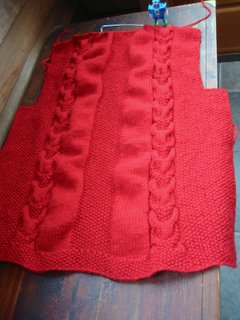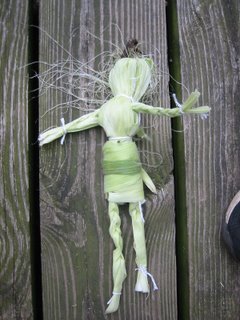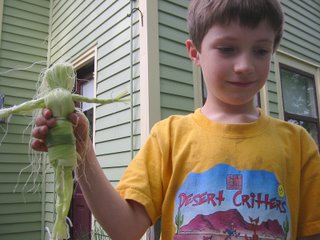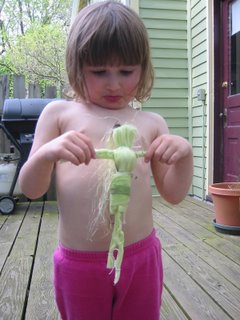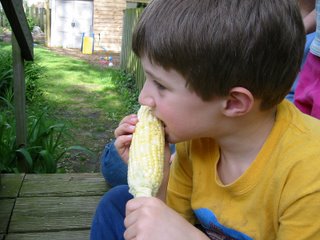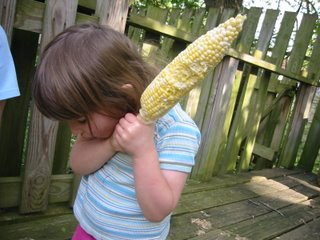On a more positive note, last Thursday my bookgroup got together for our green meal to discuss our green book, Wicked.
First the food, since good food and drink always loosens the tongue. (I am amazed when people tell me they have book groups where there isn't food or alcohol--Whhhaaaaa?)
We started off with Lea's cheesy warm artichoke dip.
 Garlicy, gooey, yum, yum, more.
Garlicy, gooey, yum, yum, more.Then we moved to the table and had Jen's beautiful asparagus soup. Jen has long claimed that she can't cook which we now all realize was just a confidence issue. The soup was excellent--velvety, warm and comforting on a chilly damp day.
 Then we loaded our plates with Sarah's spinach pasta with pesto, Marilyn's salad with avocado and asparagus and bread flecked with (green) rosemary.
Then we loaded our plates with Sarah's spinach pasta with pesto, Marilyn's salad with avocado and asparagus and bread flecked with (green) rosemary.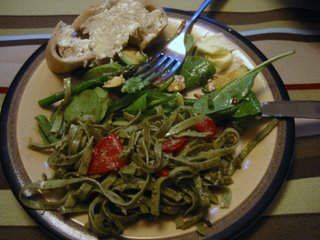 And to wash it down, those of us not on powerful antibiotics (sigh) drank a good deal of wine (in a green bottle, of course).
And to wash it down, those of us not on powerful antibiotics (sigh) drank a good deal of wine (in a green bottle, of course).For dessert I made a key lime pie with whipped cream. Ok, so key limes are yellow, but I didn't have the heart to add food coloring to it.
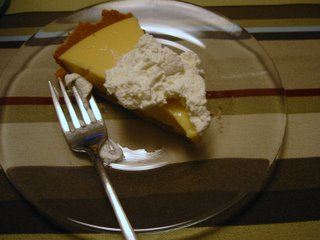
And now, the book. There were a number of expressions of frustration about the book. I think we all agreed that the first half, from childhood until Elphaba finishes college was very compelling and that after that the book lost focus. The second half didn't measure up to the promise of the first half, in part because the most interesting relationship in the book is between Elphaba and Galinda and Galinda hardly makes an appearance in the second half.
I can't understand why a good editor didn't advise Maguire to limit the story to the two witches in their college days. There were so many elements, particularly in the second half, that were undeveloped, as though the author was trying to examine way too many themes, many of which he would mention and then drop. It seems to me that the contemplation of the nature of good and evil is a complex enough topic to demand complete attention, without lots of side topics to distract the reader. This left us with lots of head scratching--what the heck was the Yackel character about? She kept popping up which makes one think her appearance must be significant, but why she was there was never clear. And all the dragon references (was Elphaba supposed to be part dragon somehow, even though the book implies she is the Wizard's daughter?) were pointing towards something, but exactly what, I can't say.
So on a global examination of the book, people enjoyed reading it, but were pretty frustrated with the decisions the author made. I think that some of the pleasure was on a paragraph level--even if it had nothing to do with the trajectory of the book, there are some ideas and emotions that are really well expressed. It is just a pity that they didn't serve the plot better. We found ourselves looking up favorite lines and picking through scenes, which makes for great conversation and once again, found that a flawed book (though not a horrible book like The News From Paraguay which everyone wanted to forget as soon as possible) can yield an excellent discussion.
Jen, in one of her moments of dry wit, drew our attention to the following sentence which is about Elphaba and her group of friends at college.
"Perhaps every accidental cluster of people has a short period of grace, in between the initial shyness and prejudice on the one hand and eventual repugnance and betrayal on the other." (p.146)
We all looked at each other. Our book group has been together now for almost 6 years--are we on the brink of repugnance and betrayal? Thank god, no! So we poured another glass of wine, ate some pie and relaxed into the comfort of each other's company.

